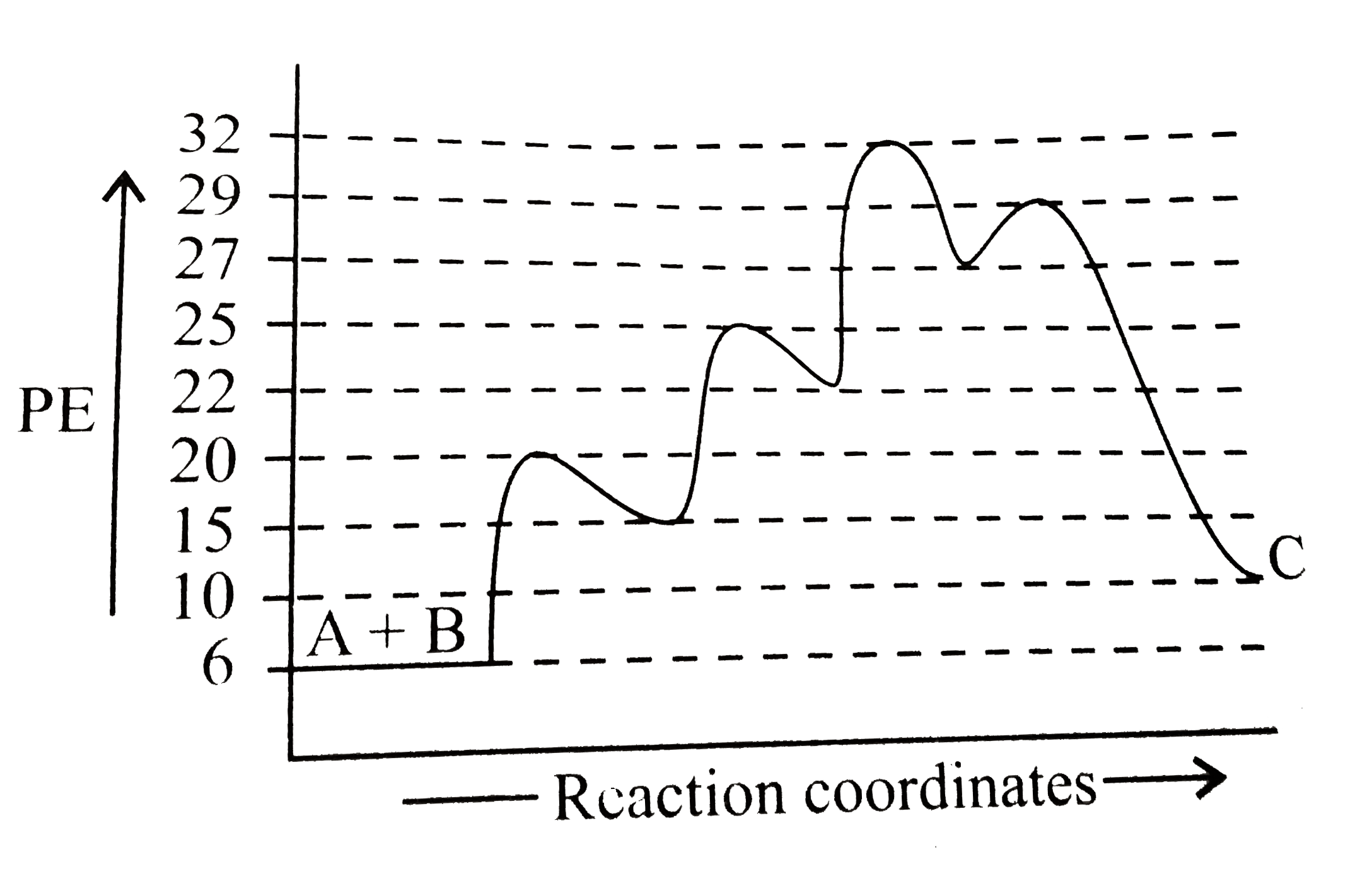What is ΔH for the reaction A+B→C where the mechanism involves several kinetics steps.

11kcal mol−1
4kcal mol−1
5kcal mol−1
22kcal mol−1
The correct Answer is:B
ΔH=10−6=4kcalmol−1
Topper's Solved these Questions
- BOOK - CENGAGE CHEMISTRYCHAPTER - CHEMICAL KINETICSEXERCISE - Exercises Assertion-Reasoning22videos
CHEMICAL KINETICS
- BOOK - CENGAGE CHEMISTRYCHAPTER - CHEMICAL KINETICSEXERCISE - Exercises Integer15videos
CHEMICAL KINETICS
- BOOK - CENGAGE CHEMISTRYCHAPTER - CHEMICAL KINETICSEXERCISE - Exercises Multiple Correct34videos
CHEMICAL KINETICS
- BOOK - CENGAGE CHEMISTRYCHAPTER - CARBOXYLIC ACIDS AND THEIR DERIVATIVESEXERCISE - Exercises Archives (Analytical And Descriptive)34videos
CARBOXYLIC ACIDS AND THEIR DERIVATIVES
- BOOK - CENGAGE CHEMISTRYCHAPTER - COORDINATION COMPOUNDSEXERCISE - Archives Subjective18videos
COORDINATION COMPOUNDS
Similar Questions
In the reaction A++B→A+B+ , there is no entropy change. Enthalpy change, ΔH equals 22 kJ mol−1 of A+ . Calculate the ΔG for the reaction . Under what condition free energy change will have negative value ?
View SolutionWhat is the mechanism involved in the halogenation reaction of alkanes?
View Solution
Knowledge Check
- Question 1 - Select One
For the reaction, A(s)+3B(g)→4C(g)+d(l)ΔHandΔU are related as :
AΔH=ΔUBΔH=ΔU+3RTCΔH=ΔU+RTDΔH=ΔU−3RT - Question 2 - Select One
The mechanism of the reaction: A+2B+C→D is
(step 1) (fast) equilibrium A+B⇔X
(step 2)(slow) X+C→Y
(step 3) (fast) Y+B→D
Which rate law is correct ?Av=k[C]Bv–=k––[A][B]2[C]Cv=k[A][B][C]Dv=k[D] - Question 3 - Select One
The rate and mechanism of chemical reactions are studied in chemical kinetics. The elementary reactions are single step reactions having no mechanism. The order of reaction and molecularity are same for elementary reactions. The rate of forward reaction aA+bB→cC+dD is given as :
rate = =(dxdt)=−1ad[A]dt=−1bd[B]dt=1cd[C]dt=1dd[D]dt or rate =K[A]a[B]b. In case of reversible reactions net rate expression can be written as : rate =K1[A]a[B]b–K2[C]c[D]d. At equilibrium, rate = 0. The constants K,K1,K2, are rate constants of respective reaction. In case of reactions governed by two or more steps reactions mechanism, the rate is given by the solwest step of mechanism.
For the reaction : aA→bB,
log[−dAdt]=log[dBdt]+0.6, then a:b is :A3.98B2.18C1.48D0
What is polymerase chain reaction (PCR) ? Explain in detail the steps involved in PCR.
View SolutionFor the exothermic reactionA+B⇒C+D.Δ(H) is the heat of reaction and Ea is the activation energy. The activation energy for the formation of A+B will be
View SolutionThe mechanism of the reaction A+2B→C+D is:
Step I: A+Bk1⇐⇒k2I
Step II: B+Ik3−−→C+D
In the first step is a fast equilibruim , then the incorrect statement is :View SolutionThe rate and mechamical reaction are studied in chemical kinetics. The elementary reactions are single step reaction having no mechanism. The order of reaction and molecularity are same for elementary reactions. The rate of forward reaction aA+bB→cC+dD is given as:
rate=(dxdt)=−1ad[A]dt=−1bd[B]dt=1cd[C]dt=1dd[D]dt or expression can be written as : rate =K1[A]a[B]b−K2[C]c[D]d. At equilibrium, rate =0. The constants K,K1,K2 are rate constants of respective reaction. In case of reactions governed by two or more steps reaction mechanism, the rate is given by the slowest step of mechanism.
For a gaseous reaction, the rate is expressed in terms of dPdt in place of dCdt or dndt where C is concentration, n is number of moles and 'P' is pressure of reactant. The three are related as:View SolutionThe rate and mechamical reaction are studied in chemical kinetics. The elementary reactions are single step reaction having no mechanism. The order of reaction and molecularity are same for elementary reactions. The rate of forward reaction aA+bB→cC+dD is given as:
rate=(dxdt)=−1ad[A]dt=−1bd[B]dt=1cd[C]dt=1dd[D]dt or expression can be written as : rate =K1[A]a[B]b−K2[C]c[D]d. At equilibrium, rate =0. The constants K,K1,K2 are rate constants of respective reaction. In case of reactions governed by two or more steps reaction mechanism, the rate is given by the slowest step of mechanism.
The rate of formation of SO3 in the following reaction,
2SO2+O2→2SO3 is 10gsec−1
The rate of disappearance of O2 will be:View Solution

